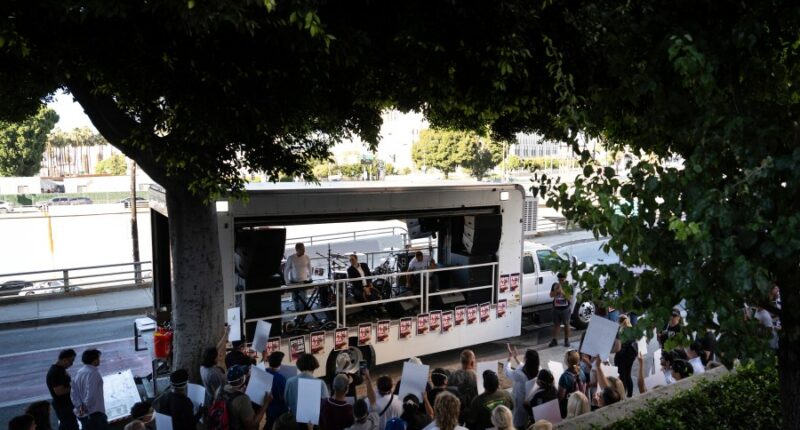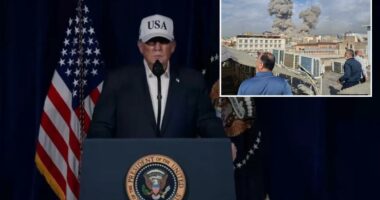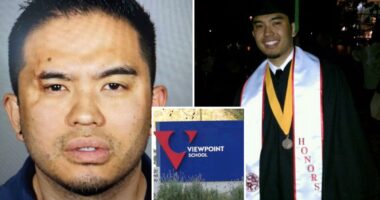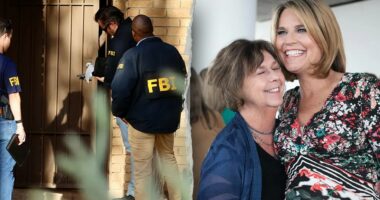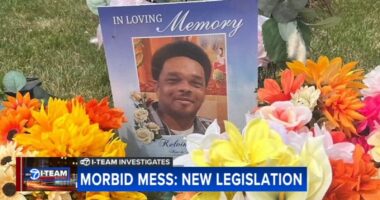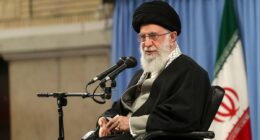Share this @internewscast.com

LOS ANGELES (AP) — Dr. Wafaa Alrashid observed a noticeable decrease in the attendance of her Latino patients for medical appointments at the Los Angeles hospital where she works, attributing it to the widespread fear caused by immigration raids.
Having a personal connection to these concerns, the Utah-born chief medical officer at Huntington Hospital understood the situation well. Her spouse, Rami Othmane, a Tunisian artist and classical musician, began carrying proof of his pending green card application for added security.
In the recent months, hundreds were detained by immigration officials in Southern California, catalyzing public demonstrations against the federal raids, which subsequently led to the involvement of the National Guard and Marines. Despite residing in the U.S. for over ten years due to his marriage to an American citizen, Othmane was caught up in the sweeping immigration enforcement actions.
On July 13, Othmane faced a stop by immigration officers while en route to a grocery store in Pasadena. He promptly presented his documentation to the authorities.
“They were indifferent, instructing him to ‘Please step out of the car,’” Alrashid recounted the chilling moment she witnessed her husband’s detainment through FaceTime.
Without delay, Alrashid drove to track her husband’s location via her phone, reaching just in time to see him being transported in the back of a vehicle.
“That was probably the worst day of my life,” she said.
The Trump administration’s crackdown on illegal immigration has ensnared not only immigrants without legal status but legal permanent residents like Othmane who has green cards. Some U.S. citizens have even been arrested. Meanwhile, many asylum-seekers who have regular check-in appointments are being arrested in the hallways outside courtrooms as the White House works toward its promise of mass deportations.
Alrashid said her husband has been in the U.S. since 2015 and overstayed his visa, but his deportation order was dismissed in 2020. They wed in March 2025 and immediately filed for a green card.
After his arrest, he was taken to the U.S. Immigration and Customs Enforcement facility in downtown Los Angeles where he was held in a freezing cold room with “no beds, no pillows, no blankets, no soap, no toothbrushes and toothpaste, and when you’re in a room with people, the bathroom’s open,” she said.
The Department of Homeland Security in an emailed statement noted the expiration of his tourist visa but did not address the dismissal of the deportation order in 2020 nor his pending green card application.
The agency denied any allegations of mistreatment, and said “ensuring the safety, security, and well-being of individuals in our custody is a top priority at ICE.”
Alrashid said for years her husband has performed classical Arabic music across Southern California. They first met when he was singing at a restaurant.
“He’s the kindest person,” Alrashid said, adding that he gave a sweater she brought him to a fellow detainee and to give others privacy, he built a makeshift barrier around the open toilet using trash bags.
“He’s brought a lot to the community, a lot of people love his music,” she said.
More than a week after his arrest, fellow musicians, immigration advocates and activists joined Alrashid in a rally outside the facility.
A few of his colleagues performed classical Arabic music, drumming loud enough that they hoped the detainees inside could hear them. Los Jornaleros del Norte musicians, who often play Spanish-language music at rallies, also were there.
“In Latin American culture, the serenade — to bring music to people — is an act of love and kindness. But in this moment, bringing music to people who are in captivity is also an act of resistance,” said Pablo Alvarado, co-executive director of the National Day Laborer Organizing Network.
Leading up to the rally, Alrashid was worried because she hadn’t received her daily call from her husband and was told she couldn’t visit him that day at the detention facility. She finally heard from him that evening.
Othmane told her over the phone he was now at an immigration detention facility in Arizona, and that his left leg was swollen.
“They should ultrasound your leg, don’t take a risk,” she said.
Alrashid hopes to get her husband out on bail while his case is being processed. They had a procedural hearing on Thursday where the judge verified his immigration status, and have a bail bond hearing scheduled for Tuesday.
Until then, she’ll continue waiting for his next phone call.
